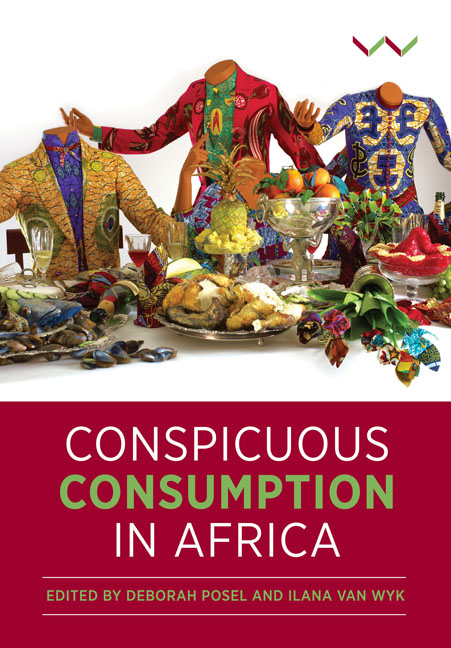Book contents
- Frontmatter
- Contents
- Acknowledgements
- List of Illustrations
- 1 Thinking With Veblen: Case Studies From Africa's Past and Present
- 2 Changes in the Order of Things: Department Stores and the Making of Modern Cape Town
- 3 Conspicuously Public: Gendered Histories of Sartorial and Social Success in Urban Togo
- 4 Etienne Rousseau, Broedertwis and the Politics of Consumption Within Afrikanerdom
- 5 Recycling Consumption: Political Power and Elite Wealth in Angola
- 6 Chiluba's Trunks: Consumption, Excess and the Body Politic in Zambia
- 7 Jacob Zuma's Shamelessness: Conspicuous Consumption, Politics and Religion
- 8 Precarious ‘Bigness’: a ‘Big Man’, His Women and His Funeral in Cameroon
- 9 Young Men of Leisure? Youth, Conspicuous Consumption and the Performativity of Dress in Niger
- 10 Booty on Fire: Looking at Izikhothane With Thorstein Veblen
- 11 Conspicuous Queer Consumption: Emulation and Honour in the Pink Map
- 12 The Politics and Moral Economy of Middle-Class Consumption in South Africa
- 13 Marigold Beads: Who Needs Diamonds?!
- Contributors
- Index
12 - The Politics and Moral Economy of Middle-Class Consumption in South Africa
Published online by Cambridge University Press: 29 October 2019
- Frontmatter
- Contents
- Acknowledgements
- List of Illustrations
- 1 Thinking With Veblen: Case Studies From Africa's Past and Present
- 2 Changes in the Order of Things: Department Stores and the Making of Modern Cape Town
- 3 Conspicuously Public: Gendered Histories of Sartorial and Social Success in Urban Togo
- 4 Etienne Rousseau, Broedertwis and the Politics of Consumption Within Afrikanerdom
- 5 Recycling Consumption: Political Power and Elite Wealth in Angola
- 6 Chiluba's Trunks: Consumption, Excess and the Body Politic in Zambia
- 7 Jacob Zuma's Shamelessness: Conspicuous Consumption, Politics and Religion
- 8 Precarious ‘Bigness’: a ‘Big Man’, His Women and His Funeral in Cameroon
- 9 Young Men of Leisure? Youth, Conspicuous Consumption and the Performativity of Dress in Niger
- 10 Booty on Fire: Looking at Izikhothane With Thorstein Veblen
- 11 Conspicuous Queer Consumption: Emulation and Honour in the Pink Map
- 12 The Politics and Moral Economy of Middle-Class Consumption in South Africa
- 13 Marigold Beads: Who Needs Diamonds?!
- Contributors
- Index
Summary
When I began studying South Africans, I was struck by the political force of debates about consumption. The emancipation of black people in post-apartheid South Africa was closely linked to and reflected in the emergence of an African middle class, which, given recent history, inevitably had racial connotations (Chevalier 2010b). The black majority have hitherto lacked substantial property, inheritance and savings; and fuelling their desire to consume commodities through moneylending has led to widespread indebtedness (James 2014). Public debate concerning this development has usually hinged on two criteria: black people's access to consumption patterns previously reserved for whites; and residential mobility, especially those households that have left the townships and segregated areas to live in the formerly white suburbs. The growth of a new middle class of consumers has been, and still is, taken as a measure of success in transforming the country's society and politics. If consumption has not exactly made this group (Herpin 1986), it has certainly been used to define it, more than other criteria.
For nine years now, I have carried out intermittent ethnographic research in eThekwini/ Durban on the lower middle class. Since 2008, I have maintained a second home in a multi-racial apartment building in the city, visiting for periods ranging from one to six months. I have interviewed members of some 50 households, some more than once. Most interviewees had children; and one in three households included extended family members. The adults were all between 30 and 50 years old. For the last three years, a major focus has been on consumption, especially on food provisioning, preparation and consumption. My informants were from all racial categories (now usually referred to as ‘communities’); and the blacks, Indians and coloureds in the study had moved out of the townships where they were once compelled to live in favour of formerly white areas. In this social class, food was the main budgetary item and its provisioning and consumption were divided between home and visits to malls, supermarkets and restaurants – and sometimes to shops in their old township (Chevalier 2012; 2017).
My recent focus on the moral economy of food among lower-middle-class consumers in Durban has led me back to my original interest in media discourse about South Africa's middle classes.
- Type
- Chapter
- Information
- Conspicuous Consumption in Africa , pp. 200 - 213Publisher: Wits University PressPrint publication year: 2019



